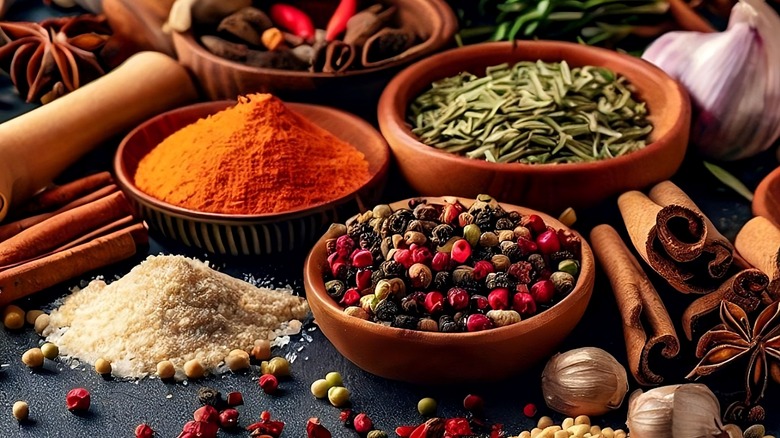What To Do If Your Finished Meal Has Too Much Of One Seasoning?
We may receive a commission on purchases made from links.
There is nothing more disappointing than toiling over the stove for hours on your next culinary achievement only to discover the dish is drastically overseasoned when you taste it. In a panic, you wonder if there is a way to rectify the situation and save the meal. However, according to chef Randy Feltis, of @KatherineWants on TikTok and the author of "Katherine Wants: The Ultimate Date Night Cookbook," your efforts might be in vain.
Some fare, including soups and salads, have quick fixes that come with some caveats. If a stew is too salty, for instance, tossing in some water or another non-salted liquid will decrease the overall salinity of the dish. Likewise, if you made a mayo-based dressing for a chicken salad, adding more mayonnaise gives you a second chance to balance the flavors. However, both of these methods obviously increase volume and may leave you with wasted food.
Still, if that immaculate roasted pork loin with a balsamic reduction and roasted harvest vegetables is overpowered with rosemary or is overly acidic, we have to be honest: it's probably back to the drawing board. "There is no way to fix that," Feltis said. It is a pretty bleak answer, but it's often true. Still, take heart, as even expert chefs make mistakes, so there is no shame in admitting your mix-ups and doing better next time. The key is to take your time while you have the opportunity, and bear in mind Feltis' sage wisdom: "Just remember you can always add more seasoning but you can't take away."
How to avoid overseasoning a dish
Your window for flavoring appetizing fare isn't as short as you might think, but when the meal is complete, the window is closed. The best way to avoid over- or under-seasoning is to taste test your dish often as you go. It is also wise to build those flavors incrementally instead of throwing all your herbs and spices in at the same time. "I like to adjust my seasoning halfway through and make sure it's under seasoned," Feltis said. "Then at the end I adjust the seasoning as needed."
Just as importantly, don't let mistakes push you out of the kitchen. One of Anthony Bourdain's genius cooking tips is if something doesn't come out right the first time, keep trying. Practice makes perfect and if you pay attention to what went wrong, you can learn from those mistakes and make sure to avoid them the next time around. If you follow Feltis' advice to keep tasting as you mindfully develop flavors in your recipe, you will start to realize where things can go wrong and, more importantly, what works to elevate your cuisine. Remember that before you put the final touches on your fare, you want to give yourself one last chance to fix anything that isn't working. As Feltis said, "make sure you are leaving room to adjust seasoning at the end."

